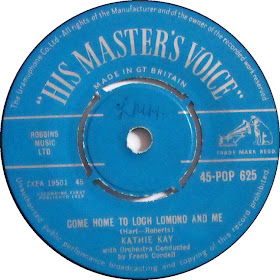John Gary (November 29, 1932 — January 4, 1998) was an American singer and a technically accomplished vocalist.
Born John Gary Strader in 1932 in Watertown, New York, Gary got his start in show business as a child, when at age five he joined his sister Shirley in a brother-sister act; the two performed on a variety of amateur talent shows. When Gary was nine, his singing won him a scholarship to attend the
 Cathedral School of St. John the Divine in New York City. At ten, he won awards for performing with the Stage Door Canteen, and when he was twelve, he toured with pianist Frank Pursley.
Cathedral School of St. John the Divine in New York City. At ten, he won awards for performing with the Stage Door Canteen, and when he was twelve, he toured with pianist Frank Pursley.He joined the Marines on his 17th birthday and became a military police officer. After his military service ended, Gary, now about 20 years old, worked making demo records for songwriters, including the prolific Henry Mancini. He was also known for his rendition of "Danny Boy," and sang it on almost every variety show of the 1960s and 1970s, including those hosted by Ed
 Sullivan, Jack Paar, Johnny Carson, Steve Allen, Merv Griffin, and Carol Burnett. In the 1960s, Gary worked as a summer replacement for Danny Kaye, and as a result he was given his own three-year show, "The John Gary Show."
Sullivan, Jack Paar, Johnny Carson, Steve Allen, Merv Griffin, and Carol Burnett. In the 1960s, Gary worked as a summer replacement for Danny Kaye, and as a result he was given his own three-year show, "The John Gary Show."Gary sang in movies, on Broadway, and appeared at Carnegie Hall, with numerous symphonies. He appeared 30 times as a guest on The Tonight Show with Jack Paar, Steve Allen and Johnny Carson. He traveled across the U.S. and Canada with approximately 40 concerts per year. For six years he gave Community concerts in over 400 cities and towns. He was a stylized singer, who recorded 23 albums for RCA Victor Records.
Gary was considered by many to be one of the best crooners due to his extraordinary breath control and tonal quality of
 his voice. He had an exceptionally wide range of three octaves. His singing ranged from robust baritone to a high sweet tenor often in the same song. Many popular songs of the time were suited to his intimate style.
his voice. He had an exceptionally wide range of three octaves. His singing ranged from robust baritone to a high sweet tenor often in the same song. Many popular songs of the time were suited to his intimate style.In 1960, he joined ASCAP and composed several popular songs. He had five songs that made the adult contemporary (or easy listening) chart in Billboard magazine. The song "Cold", released in 1967, was his most successful, topping the chart for two weeks at the end of that year. However, the song failed to crack the Billboard Hot 100 pop chart. In 1968 he voiced John Alden in the Rankin/Bass Animated TV special "The Mouse on the Mayflower".
Gary married his wife, Lee, a native of New Orleans, in 1971; they had one daughter and seven sons. The family moved to Chicago when Gary was offered a contract to sing for a popular radio show there called "The Breakfast Club." He then went to New York City, where he was offered a contract with RCA. He was 30 years old. He continued to record with RCA for many years, until his style of music fell from popular favor with the rise of rock and roll, but while his music was still popular he made about 50 albums, half of them with RCA and half on various
 independent labels. The highlights of his career are collected on two albums, The Very Best of John Gary and The Essential John Gary.
independent labels. The highlights of his career are collected on two albums, The Very Best of John Gary and The Essential John Gary.Gary became ill with prostate cancer in his later years, and after a long battle with the illness, died from it in Dallas, Texas, on January 4, 1998. He was survived by his wife and their eight children, as well as by several grandchildren. The John Gary Memorial Fund was established in his memory, to provide music scholarships to promising male singers.
(Info edited from Answers.com & Wikipedia)
Here's "Danny Boy " from John Gary's 1964 LP So Tenderly













































